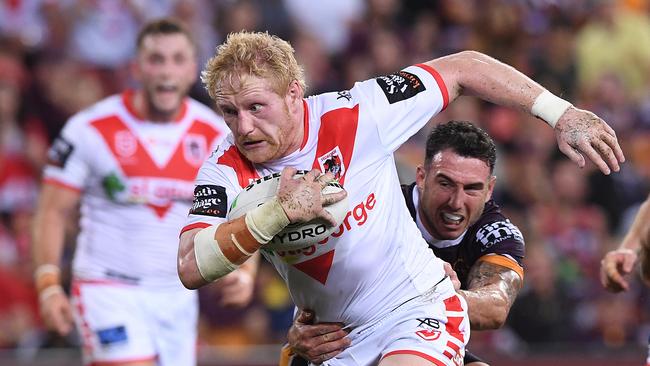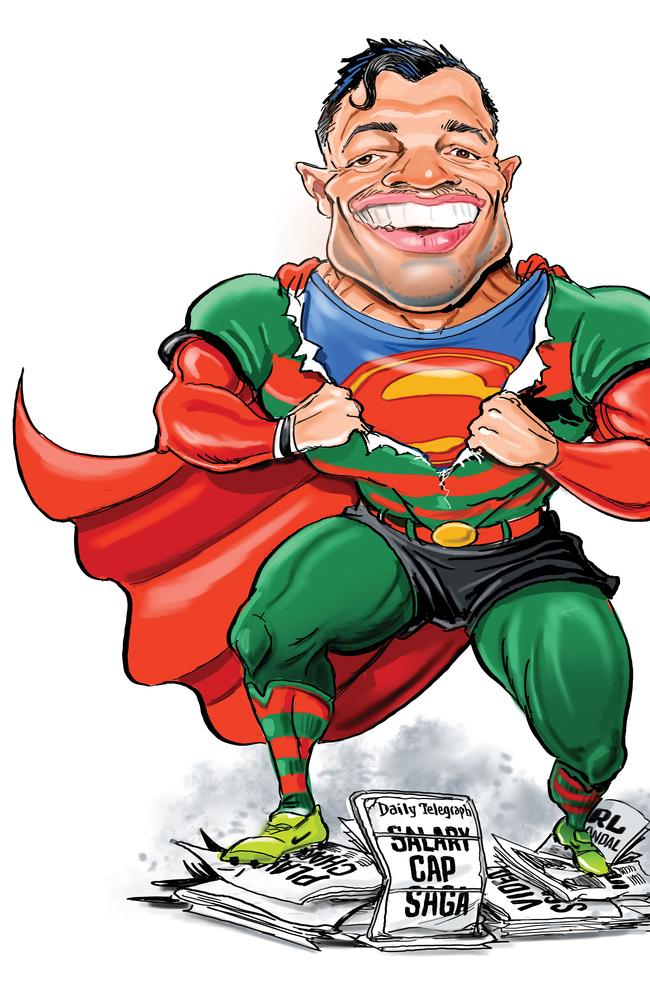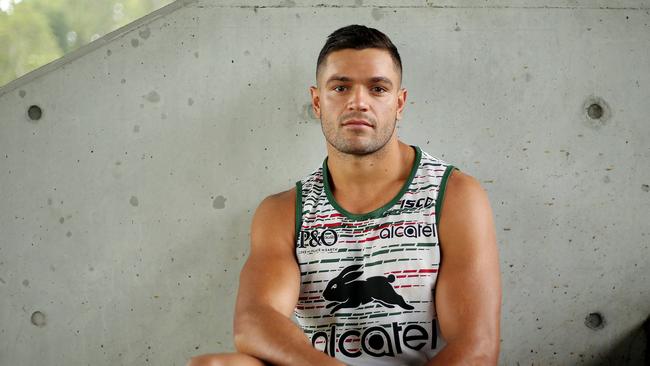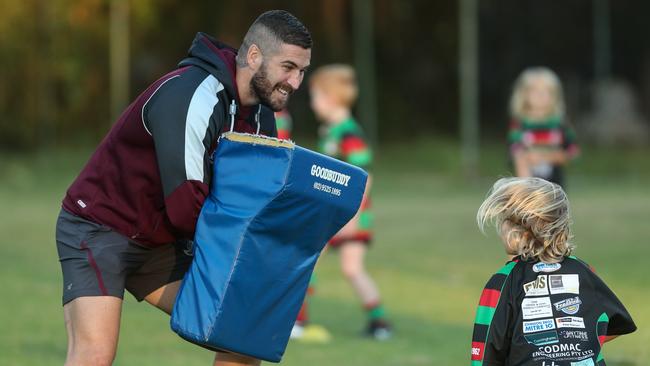Paul Kent: Rugby league players are either ruled by their past or use it to change their lives
Many rugby league players come from tough backgrounds but, as Braidon Burns and others have showed, the game often offers opportunities to break the cycle writes PAUL KENT.
OVERCOME: How Burns rose above
EXTENSION: Pay will stay at Canterbury
Many years ago, when the world had more forgiveness in its heart, the American sportswriter Red Smith wrote how boxing gave men a career who might otherwise be committing crimes for a living.
The boxing game was filled with head breakers and mob muscle.
In boxing they found discipline and hope. Not always in that order, but once committed many have gone on to channel their anger and violence in a way that has benefited their lives.
George Foreman was a young hoodlum who in the boxing ring found a belief in him that wasn’t there before. Foreman catapulted that into a boxing career and, 40 years later, left boxing so popular he became America’s salesman.
Mike Tyson was a New York street mugger who found boxing while in reform school. Tyson, always easily led, channelled his anger into the fight game to become the youngest heavyweight champion ever and then, just when he seemed to have it all worked out, lost his way again.
LISTEN! In the second episode of his No.1 podcast, Matty drills down on the Keary/Cronk combination, lauds the small forward revolution and tells how the Knights almost sacked him - twice.
Tyson grew lazy and overconfident on success, forgot all he learned, and went back to jail. He has reinvented himself with a hit stage show and also as a comedic actor, his road back achieved with a return to the discipline he learned in boxing.
James Graham is one of rugby league’s lateral thinkers. He likes to joust and, earlier this month, was in his second job on NRL360 when he began channelling Red Smith.
In previous weeks Graham’s teammate Jack de Belin had emerged as the face of the NRL’s summer of scandal. De Belin was hardly on his own.
It began with the Bulldogs’ Mad Monday and quickly escalated to criminal charges against Jarryd Hayne and barely slowed the entire summer.
The game reeled. NRL CEO Todd Greenberg called the off-season a “train wreck”.
De Belin is facing aggravated sexual assault charges and his club was fighting to avoid de Belin’s NRL suspension when Graham appeared. It was a consequence of timing that when Graham popped up on NRL360 de Belin was dominating the moment.

Graham supports and believes de Belin. He stepped away from the obvious defence, though, realising a shrill cry would penetrate only sympathetic ears, and he appealed for understanding.
“It’s a very aggressive sport, aggressive nature,” Graham said. “There’s probably only a similar population dispersion to it in prison or maybe in the army.”
It was not quite what the NRL wanted to hear at the time but Graham was speaking at a level that most, nowadays, barely bother to explore.
“Understanding is not excusing behaviour,” he said.

It is what Graham, in his heart, believes to be true.
Rugby league is a tough game played by tough men, and tough women now too, and to find those tough men recruiters often have to go into environments where not a lot of doctors and lawyers are graduating.
In his own way he was saying you can’t recruit from such a background and give the player no education in proper behaviour and then complain when they behave as many from their environment also do.
What is normal in my world might not be normal in yours.
Unfortunately when poor behaviour arises many of us look upon the act and wonder what went wrong at the club, with the game, for players to believe any of it was okay. The truth is, it is often unremarkable where they came from.
Braidon Burns has such a background. His recollections to Nick Walshaw in this week’s Telegraph were terrifying.
His mother and father were both sent to jail, armed robbery and drugs, and his grandparents brought him up in Coonamble.
Not so long ago his mum turned up at training asking for money for drugs. It broke his heart to say no.
“She got real upset,” he told Walshaw. “Started crying. Which really shook me up. I was struggling. Eventually, I went back inside the sheds …”
Time and again his parents let him down, even after they left jail and promised all those promises children want to hear. They remain “stuck in the cycle”, Burns said, even today.
As best we can tell, we can attribute Burns’ stellar character to his grandparents and the values they instilled when they took him into their home after his parents let him down.
Burns was taught early the difference between right and wrong and effort and reward, all those qualities we take for granted in what we would call a normal household.
Among it all he began playing rugby league when he was three and which he now describes as his “outlet”.

While mum was overdosing or dad was robbing stores Burns found the game and, within it, a character and discipline required that was missing in his parents’ home. A joy, too.
It would surprise many to be told his is not the only story like this in rugby league. It is far more common within NRL clubs than many believe.
While Graham was in Brisbane this week his place was filled on NRL360 by Joel Thompson, who was breaking and entering by the time he was 13 and thought it was normal to be pursued by police.
His teenage twin brothers are in and out of juvenile justice centres.
Domestic violence and drug and alcohol abuse were part of what he thought was a normal childhood. Some of the more horrific parts of his childhood have not been revealed.
This week Thompson spent time in Christchurch visiting children in the community affected by the recent shooting horror that shook the world. He went out with his Manly teammates before Saturday’s game against the Warriors.

Thompson often found himself in trouble early in his career. At times the club smoothed over problems.
His wife Amy finally convinced him to get help seven years ago and he credits it with not just saving his career but, possibly, his life.
He now volunteers with various charities, moving with each sift of club. He now spends Monday nights volunteering with the Gamarada healing group in Redfern.
It is a power not every player accepts.
While telling Walshaw his story Burns acknowledged the reluctant truth for many NRL players.
“I want to be a role model to kids,” he said.
He understands it and embraces it. And in the honesty of his story, he realises its power.
OLD VS NEW
One of the tireless themes of sport is the old bull against the young lion, youth versus experience.
It’s on again Saturday night in Bathurst.
James Maloney has emerged as one of the NRL’s most influential playmakers in recent years. He won a premiership with the Sydney Roosters and then again with Cronulla.
Penrith recruited him to polish up its premiership charge.
Maloney’s career has been highlighted by a, shall we say, casual approach to defence while he went about showing how dangerous he was in attack.
In many ways he is a classic playmaker.
The same can’t be said for Cameron Munster.
The young Melbourne throwback is highly unorthodox. He plays in the NRL’s most disciplined team and is their most undisciplined player, which makes him so dangerous.
Munster does not play like most halves, who count numbers in their sleep and are always looking for numerical advantage.
Munster plays on instinct, often taking the ball not because he sees a shortage in numbers opposite but simply because he senses something is on.
Munster backs himself to beat his opponent like the old-time footballers used to do. Give me the ball and let me run over them, through them, around them.
As Melbourne deals with the loss of Billy Slater with a return to their precise, disciplined systems Munster looms as the X-factor that make Melbourne a threat once more.
On Saturday night they go up against each other in Bathurst, two yappy playmakers who have sublime talents and fast mouths.
All anybody is certain of is that they will drive each other mad.


